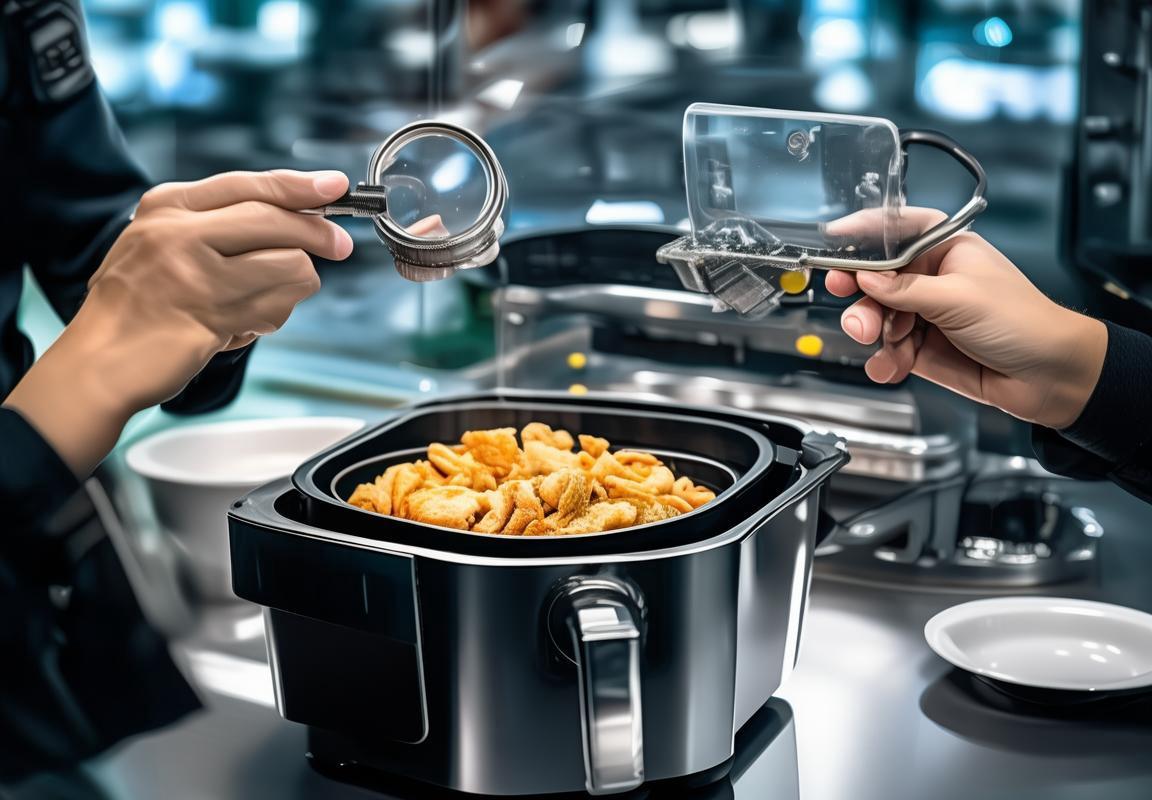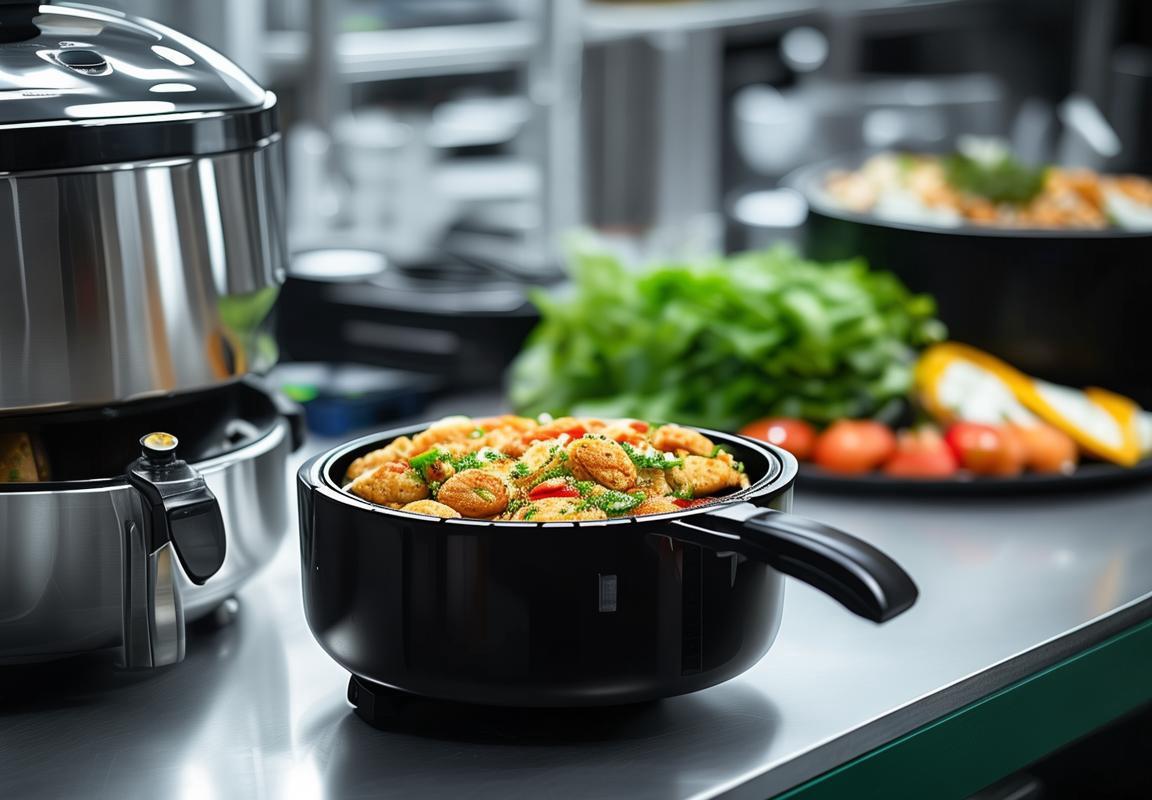Navigating the complex landscape of international sourcing, especially when dealing with the vast and diverse market of Chinese air fryer suppliers, can be daunting. Ensuring that the suppliers you choose are reliable, quality-focused, and compliant with international standards is paramount. This article delves into the nuances of building trust and fostering long-term relationships with these suppliers, emphasizing the critical steps of verifying their capabilities and maintaining that trust over time.
Understanding the Importance of Verifying China Air Fryer Suppliers
In today’s global marketplace, the demand for high-quality air fryers has surged, with many manufacturers looking to China as a prime source for these innovative kitchen appliances. However, with the vast array of suppliers out there, it’s crucial to understand why thorough verification of these China air fryer suppliers is not just advisable, but essential. Here’s why:
Quality Assurance: The heart of any successful business lies in the quality of its products. When you’re dealing with suppliers from another country, especially one as vast and diverse as China, ensuring that the air fryers meet international quality standards is paramount. A faulty product can lead to customer dissatisfaction, negative reviews, and even safety hazards.
Cost-Effectiveness: While the allure of lower prices might be tempting, it’s essential to verify that these savings don’t come at the cost of quality. A supplier that offers rock-bottom prices might be cutting corners on materials or production, leading to a shorter lifespan for the air fryers or potential safety issues.
Brand Reputation: Your brand’s reputation is everything. If you’re sourcing air fryers from a supplier that doesn’t meet quality expectations, it can tarnish your brand’s image. Customers expect reliability and safety from products that bear your logo, and a subpar supplier can undermine that trust.
Regulatory Compliance: Different countries have different regulations regarding product safety and environmental standards. Verifying that your China air fryer supplier complies with these regulations ensures that your products are not only safe but also environmentally responsible.
Long-Term Relationships: Building a lasting business relationship with a supplier is key to a smooth supply chain. By verifying suppliers, you lay the foundation for a partnership that can withstand the test of time, offering consistency in product quality and delivery.
Customer Safety: At the end of the day, your customers’ safety should always be a top priority. An unverified supplier could provide products that pose health risks, leading to potential legal liabilities and damage to your brand’s integrity.
Market Trends: The air fryer market is dynamic, with new technologies and features constantly emerging. A reliable supplier will keep up with these trends and be able to offer you innovative products that appeal to your customers.
Financial Stability: Verifying a supplier’s financial stability can save you from potential business disruptions. Suppliers with a solid financial foundation are more likely to honor contracts and provide consistent service, reducing the risk of delays or cancellations.
Global Trade Knowledge: Working with international suppliers requires a deep understanding of global trade practices. Verifying suppliers ensures that you’re dealing with professionals who understand the complexities of cross-border transactions, from shipping to customs.
Innovation and Development: A reputable supplier will be committed to innovation and continuous product development. This means they’ll be able to adapt to changing market demands and provide you with cutting-edge air fryer models.
In conclusion, the importance of verifying China air fryer suppliers cannot be overstated. It’s an investment in your business that pays off in quality products, customer satisfaction, and a strong, reputable brand. By taking the time to thoroughly vet your suppliers, you’re not just ensuring the success of your current operations; you’re also setting the stage for future growth and success.

Researching Supplier Background
Navigating through the vast landscape of international suppliers, especially for a product as specialized as air fryers, requires a meticulous approach. Researching the background of potential China air fryer suppliers is a cornerstone in this process. It’s not just about finding someone who sells the product; it’s about finding a reliable, long-term partner who can deliver on quality, service, and sustainability.
Understanding the supplier’s history is key. Dive into their company profile, looking for the duration of their operations. Established suppliers with a proven track record are more likely to have refined processes and a better understanding of the market. A brief history of the company can provide insights into their stability and growth trajectory.
Next, explore the company’s mission and values. A supplier’s core beliefs can reflect how they do business. If their mission aligns with your own company’s values, it can be a strong indicator of a harmonious partnership. Look for any statements about quality, innovation, or customer satisfaction, as these are key indicators of a supplier’s focus.
The market reputation of the supplier is also vital. Look for reviews and testimonials from other customers, especially those in the same industry as you. Have they been mentioned in trade publications or received awards for their products or services? These can be signs of a respected and reputable supplier.
Another important aspect is the supplier’s network. Find out who they work with and if they have a strong distribution network. A supplier with a broad customer base and a reliable distribution chain is likely to be more dependable. Additionally, check if they have any strategic partnerships that could benefit your business.
Understanding the supplier’s capabilities is crucial. Look at their product range to see if they offer a variety of air fryers that cater to different market segments. This diversity can be an asset if you’re looking to expand your product line or cater to a wider audience. Additionally, inquire about their production capacity and ability to scale up if needed.
Transparency in business practices is non-negotiable. A supplier who is open about their manufacturing processes, materials used, and certifications held is more likely to be trustworthy. Check if they are transparent about pricing, delivery times, and payment terms. This openness can prevent misunderstandings and build a strong foundation for a business relationship.
It’s also wise to consider the supplier’s approach to sustainability and ethical practices. In today’s market, consumers and businesses alike are increasingly concerned about the environmental and social impact of their choices. A supplier that is committed to sustainable and ethical operations can enhance your brand’s image and may even attract environmentally conscious customers.
Social responsibility is another dimension to explore. Find out if the supplier contributes to local communities or supports any social initiatives. This can be a reflection of their corporate culture and a positive aspect for your business, especially if you want to align with social causes.
Lastly, consider the supplier’s communication style. Are they responsive and easy to work with? Effective communication is crucial for a smooth business relationship. A supplier who listens to your needs and communicates clearly can help address any issues that may arise quickly and efficiently.
In summary, researching a supplier’s background is a multifaceted process that requires a comprehensive approach. By delving into their history, reputation, capabilities, transparency, sustainability efforts, social responsibility, and communication style, you can gain a clearer picture of whether they are the right partner for your air fryer needs. Remember, a thorough background check can save you from potential headaches and set the stage for a successful, long-lasting collaboration.

Checking Legal and Compliance Records
Understanding the legal and compliance landscape of a supplier is not just about adhering to regulations; it’s about ensuring the integrity and reliability of the products you’re bringing into your market. Here’s a deep dive into the intricacies of this process:
-
Verifying Business Registration: It all begins with confirming that the supplier is a legally registered entity. This involves checking the company’s registration number, which can typically be found on their official website or business documents. Ensure that the registration is current and that the company is not on any regulatory watchlists.
-
Evaluating Trade Licenses: Beyond registration, suppliers should hold the necessary trade licenses to operate in their industry. These licenses vary by country and region, but they often include certifications for manufacturing, import/export, and environmental compliance. Verify that these licenses are valid and have not expired.
-
Inspection of Tax Compliance: Tax compliance is a critical indicator of a supplier’s financial health and legal standing. Check if the supplier has a valid tax identification number and ensure that they are up-to-date with their tax obligations. This can be done by reviewing their tax returns or contacting the relevant tax authorities.
-
Reviewing Industry-Specific Regulations: Different industries have their own set of regulations. For air fryer suppliers, this might include safety standards, electrical certifications, and environmental regulations. Look for certifications like CE, UL, or ETL, which are recognized globally and indicate that the product meets certain safety and quality standards.
-
Assessing Environmental Compliance: Environmental regulations are becoming increasingly important. Ensure that the supplier adheres to local and international environmental laws, such as those governing waste disposal, emissions, and resource usage. This can be confirmed through environmental impact assessments or certifications like ISO 14001.
-
Understanding Labor Laws: The supplier’s compliance with labor laws is crucial for ethical business practices. Check if the supplier complies with minimum wage laws, working hours, and employee benefits. Look for certifications like SA8000, which focuses on social responsibility in the workplace.
-
Investigating Intellectual Property Rights: Intellectual property rights are vital for protecting your brand and ensuring that the supplier is not infringing on others’ patents or trademarks. Verify that the supplier has the rights to the products they are selling and that they do not engage in any form of counterfeiting or unauthorized copying.
-
Auditing Supply Chain Transparency: A supplier’s ability to provide transparency in their supply chain is a strong indicator of their compliance. Ask for detailed information about their suppliers, including their own compliance records. This can help uncover any potential issues further down the line.
-
Checking for Legal Disputes: Sometimes, legal disputes can arise, which could impact the supplier’s ability to fulfill orders. Conduct a thorough search for any ongoing or past legal disputes, bankruptcy filings, or other legal issues that might affect their reliability.
-
Consulting with Legal Experts: If you’re unsure about any aspect of the supplier’s legal and compliance records, it’s wise to consult with legal experts. They can provide insights into specific regulations and help you navigate complex legal landscapes.
-
Regular Audits and Updates: Compliance is not a one-time check; it’s an ongoing process. Regularly audit the supplier’s legal and compliance records to ensure they continue to meet the required standards. This might involve periodic site visits or ongoing communication with the supplier’s legal department.
-
Building a Relationship Based on Trust: By thoroughly checking the legal and compliance records of your suppliers, you’re not only protecting your business but also building a foundation of trust. A supplier that is transparent and compliant is more likely to be reliable and long-term partner.
In essence, the due diligence process for legal and compliance records is about uncovering any potential red flags that could lead to legal issues, financial losses, or reputational damage. It’s a detailed and meticulous process, but one that is essential for the success and sustainability of your business.

Evaluating Product Quality Control
When it comes to purchasing air fryers from Chinese suppliers, ensuring that the product meets the highest quality standards is paramount. Here’s a closer look at how to evaluate the product quality control process:
-
Inspecting Production Facilities: A visit to the manufacturing plant can provide valuable insights into the quality control measures in place. Pay attention to the cleanliness, organization, and use of advanced machinery. A well-maintained facility often indicates a supplier committed to producing high-quality products.
-
Understanding the Materials Used: The quality of the air fryer’s components is crucial. Ask suppliers about the materials they use for the heating element, basket, and housing. Look for information on whether these materials are food-grade and have been tested for safety and durability.
-
Certifications and Standards: Check if the air fryers comply with international safety standards such as CE, UL, or ETL. These certifications are a strong indicator that the product has been tested and approved for use in different regions.
-
Quality Control Protocols: Inquire about the supplier’s quality control protocols. A reputable supplier should have a multi-step process in place, including inspections at various stages of production. This could include incoming material inspections, in-process checks, and final product inspections.
-
Testing Procedures: Ask for details about the testing procedures for the air fryers. This includes how they test for heat distribution, safety features, and longevity. Suppliers should be able to provide data or test results to back up their claims.
-
Longevity and Durability Tests: A good quality control process should include tests for the longevity and durability of the product. This could involve drop tests, endurance tests, and stress tests to ensure the air fryer can withstand normal use over time.
-
Customer Feedback: Look into customer reviews and feedback regarding the durability and performance of the air fryers. Customers who have used the product for an extended period can provide insights into how well it holds up over time.
-
Return and Warranty Policies: A supplier with confidence in their product quality control will offer a solid return and warranty policy. This shows that they stand behind their products and are willing to address any issues that may arise.
-
Continuous Improvement: A quality-focused supplier is always looking to improve. Ask about any initiatives they have in place to enhance product quality, such as regular updates to their manufacturing processes or investments in new technologies.
-
Employee Training: The expertise of the employees in the manufacturing process is crucial. Inquire about the training and qualifications of the workers who assemble and test the air fryers. Skilled workers are more likely to produce a higher-quality product.
-
Vendor Audits: Consider requesting a third-party audit of the supplier’s quality control process. An independent assessment can provide an unbiased view of the supplier’s compliance with quality standards.
-
Comparative Analysis: If possible, compare the air fryer you’re considering with similar products from other suppliers. Look for differences in build quality, materials, and design features that could impact performance and longevity.
-
Understanding the Supply Chain: A supplier with a robust supply chain is more likely to maintain consistent quality. Ask about their supplier relationships and how they ensure that all components meet the same high standards as the final product.
-
Engaging with Technical Experts: Don’t hesitate to engage with technical experts or engineers from the supplier. They can provide detailed insights into the design and engineering aspects of the air fryer, which are critical for quality.
-
Long-Term Partnership Potential: Consider the potential for a long-term partnership. A supplier who is transparent about their quality control process is more likely to be a reliable partner for your business.
By thoroughly evaluating these aspects of the product quality control process, you can make a more informed decision when selecting a Chinese air fryer supplier, ensuring that you’re getting a product that meets your expectations and the needs of your customers.

Reviewing Customer Feedback and Testimonials
Navigating through customer feedback and testimonials can be like uncovering a treasure trove of insights into the true performance and reputation of a product or service. Here’s a delve into the intricacies of this process:
Understanding the LandscapeCustomers’ experiences are the raw data of the market. They provide an unfiltered view of what it’s like to use a product in real life. By reviewing this feedback, you can gauge how well a product is received and identify any common issues or strengths.
Identifying Patterns and TrendsLook for patterns in the feedback. Are there repeated complaints about a specific feature? Or are there many positive mentions of the same aspect? This can reveal whether a product is consistently meeting expectations or if there are underlying issues that need addressing.
Analyzing the SentimentThe sentiment behind the feedback is crucial. Are customers largely satisfied, or are there signs of disappointment? Sentiment analysis can help you determine if the overall mood is positive, negative, or mixed, which can be indicative of the product’s overall quality.
Cross-Referencing with Other SourcesDon’t rely on just one platform for feedback. Cross-reference testimonials and reviews from various online stores, social media, and consumer forums. This broader perspective can help confirm trends and provide a more comprehensive understanding of customer satisfaction.
Spotting Red FlagsBe wary of overly positive or negative reviews. These can sometimes be indicative of fake feedback, either from competitors or from the company itself. Look for a mix of reviews that represent a range of experiences to get a true picture.
Listening to the Voice of the CustomerCustomers often provide detailed insights into what they like and dislike about a product. Pay attention to the specifics they mention. Are they highlighting the design, functionality, or customer service? This can guide you in understanding the product’s strengths and weaknesses.
Considering the ContextFeedback should be considered within the context of the product’s use. For instance, a high price point might naturally attract more negative reviews, so it’s important to compare the feedback with similar products in the same price range.
Understanding the Impact of Reviews on Purchase DecisionsCustomer reviews significantly influence purchasing decisions. When a potential buyer sees a product with predominantly positive reviews, it can build trust and confidence in the product’s quality. Conversely, a string of negative reviews can be a red flag.
Recognizing the Importance of TimingTiming can be everything when it comes to reviews. A product launch might see a surge in feedback as users try it out for the first time. Similarly, a recall or product update can trigger a new wave of reviews. Understanding the timing of feedback can help you assess its relevance.
Engaging with Customers DirectlySometimes, reaching out to customers who have left feedback can provide even deeper insights. This direct engagement can help you understand the context of their review and possibly address any concerns they might have.
Remembering the Role of Social ProofSocial proof is a powerful concept. When others vouch for a product, it can significantly influence potential buyers. Look for testimonials that not only praise the product but also provide a personal story or use case that resonates with potential customers.
In conclusion, reviewing customer feedback and testimonials is a nuanced process that requires careful attention to detail and a balanced perspective. It’s through this analysis that you can truly understand the customer experience and make informed decisions about the products you consider for your business or personal use.

Inspecting the Factory and Production Process
Stepping onto the factory floor, the first thing that hits you is the sheer scale of the operation. Rows upon rows of machinery hum and whir, each piece meticulously designed to perform its specific function in the production process. The air is filled with the familiar scent of plastic being molded and metal being shaped, a testament to the hard work and precision that goes into crafting air fryers.
The assembly line is a well-oiled machine, where each step is meticulously choreographed. Workers move with purpose, their hands moving deftly as they handle components that will soon become a functioning appliance. It’s a dance of efficiency, where every movement is calculated to ensure that the end product meets the highest standards.
Inspecting the components, you can’t help but notice the quality of the materials used. Aluminum, stainless steel, and plastic are all of a high grade, reflecting the supplier’s commitment to durability and reliability. The attention to detail is evident in the smoothness of the surfaces and the precision of the fittings, which are essential for the air fryer’s performance.
As you move through the factory, you come across the quality control stations. These areas are designed to scrutinize each product at various stages of the manufacturing process. Inspectors, often with years of experience, meticulously examine every unit, looking for any defects or inconsistencies. They use magnifying glasses to check for soldering issues, calipers to measure tolerances, and even electronic sensors to test for any irregularities in the electrical components.
One of the most intriguing aspects of the production process is the cooking test. Air fryers are subjected to simulated cooking cycles to ensure that they can handle the demands of everyday use. Workers fill the fryers with a standardized amount of oil and test ingredients, like chicken strips or french fries, to ensure that the cooking time and temperature are consistent with the specifications.
The testing doesn’t stop there. Air fryers are also tested for their safety features, including overheat protection, automatic shut-off functions, and non-slip bases. These tests are crucial for ensuring that the products that reach consumers are not only high-performing but also safe to use.
In the final stages of production, the air fryers are packaged. The packaging process is as careful as the production itself. Each unit is wrapped in protective materials, and the boxes are labeled with the necessary information, including the model number, manufacturing date, and any warnings or instructions for use.
Walking through the factory, you might also come across the design and engineering team. These professionals are constantly working on improving the product, whether it’s through enhancing the cooking capabilities, making the design more user-friendly, or ensuring that the manufacturing process remains efficient and cost-effective.
The factory floor is also a hub of innovation. Prototypes of new air fryer models are often in various stages of development, showcasing the supplier’s dedication to staying ahead of market trends and consumer needs. These models are tested and refined, with input from both the engineers and potential customers.
As you leave the factory, you carry with you a sense of confidence in the product. The inspection of the factory and production process has given you a firsthand look at the dedication to quality and safety that the supplier embodies. From the choice of materials to the rigorous testing, every aspect of the production is designed to deliver a high-quality air fryer that will stand the test of time and meet the expectations of the consumer.

Requesting Sample Testing and Certification
Understanding the intricacies of a product’s development and ensuring its quality often hinges on the thoroughness of sample testing and certification processes. Here’s a detailed look into how these steps are executed:
In the pursuit of verifying the quality of air fryers from Chinese suppliers, requesting samples is a pivotal step. These samples serve as tangible representations of the product’s potential and its adherence to specifications.
Once the samples arrive, the first thing to inspect is the packaging. It should be secure, indicating that the product was handled with care during transit. Any signs of damage or tampering can be a red flag.
The physical examination of the air fryer itself is the next step. Look for any manufacturing defects such as uneven welding, misaligned parts, or visible rust. The surface finish should be smooth and free from blemishes.
Inside the air fryer, check the components and controls. The buttons and dials should be responsive, and the display should be clear and easy to read. The heating element is critical, so ensure it’s evenly distributed and there are no exposed wires.
Functional testing is crucial. Plug in the air fryer and observe its performance. It should heat up quickly and maintain a consistent temperature. The cooking process should be smooth, with no unusual noises or fluctuations in power.
Safety features are non-negotiable. Verify that the air fryer has an automatic shut-off feature in case of overheating or a power surge. The cord should be of good quality and the plug should fit securely into the outlet.
For a more comprehensive assessment, consider sending the sample to an independent testing laboratory. These labs can conduct rigorous tests for safety, performance, and durability.
Certification is another layer of assurance. Products should comply with international safety standards such as CE, UL, or RoHS. Requesting certification documents ensures that the air fryer meets these standards.
Inspect the certification labels on the sample. They should be clear, legible, and affixed in a way that indicates they haven’t been tampered with.
If the air fryer is designed for specific markets, ensure that it has the necessary certifications for those regions. For example, if it’s intended for the United States, it should have a UL certification.
In addition to certifications, review the supplier’s quality control processes. Ask about their quality management system and any third-party audits they’ve undergone.
The supplier should be able to provide documentation of their quality control procedures, including inspection records, quality control checklists, and any certifications they hold.
Lastly, consider the supplier’s willingness to provide samples and certifications. A supplier who is hesitant or unwilling to comply may not be committed to maintaining high-quality standards.
Remember, a well-documented and tested sample is your best assurance that the air fryer you’re considering purchasing will meet your expectations and those of your customers.

Verifying after Purchase: Continuous Monitoring
Navigating the journey after a purchase is just as crucial as the selection process itself. Ensuring the ongoing quality and performance of the product you’ve acquired from a Chinese air fryer supplier requires a vigilant approach. Here’s how to maintain that watchful eye:
Maintaining Regular Communication
Keen on staying informed, it’s vital to maintain open lines of communication with your supplier. Regular updates on production, shipping, and any potential issues can be a source of reassurance. Keeping in touch also allows for the timely resolution of any concerns that may arise post-purchase.
Monitoring Product Performance
Once the air fryers arrive, it’s time to put them to the test. Observe how they perform under various cooking conditions and durations. Are they heating evenly? Do they maintain consistent temperatures? Pay attention to the longevity of the unit and its ability to handle different types of food.
Tracking Customer Satisfaction
Customer satisfaction is a barometer of product quality. Collect feedback from your customers on their experience with the air fryers. Are they pleased with the cooking results? Do they encounter any issues? This feedback can provide valuable insights into any potential problems that might need addressing.
Ensuring Corrective Actions Are Taken
If any issues are identified, it’s essential to ensure that your supplier is responsive and willing to take corrective actions. This could involve sending replacement parts, providing technical support, or even arranging for a full product exchange. The supplier’s willingness to address problems is a reflection of their commitment to quality.
Reviewing Logistics and Shipping
The logistics of shipping and delivery can impact product quality. Examine the packaging to ensure it’s adequate to protect the air fryers during transit. If there’s damage upon arrival, assess whether it was due to poor packaging or inadequate handling. This review can help prevent future incidents.
Checking for Recurring Issues
Over time, look for patterns or recurring issues with the air fryers. Are certain models experiencing higher rates of customer dissatisfaction? Identifying common problems can help you and your supplier work together to implement improvements.
Engaging in Regular Quality Audits
Conducting regular quality audits can be an effective way to maintain high standards. These audits should cover a range of aspects, from raw material sourcing to the final product inspection. It’s a proactive measure that can help identify any gaps in the quality control process.
Staying Informed About Industry Regulations
Regulations can change, and it’s important to stay up-to-date. Ensure that your supplier is compliant with all relevant industry standards and regulations. This includes safety standards, energy efficiency requirements, and any specific certifications that are important for your market.
Establishing Long-Term Partnerships
Continuous monitoring is not just about catching issues; it’s also about building trust. Establishing long-term partnerships with suppliers who are committed to quality can lead to more stable supply chains and improved product consistency over time.
By remaining proactive and engaged in the monitoring process, you can ensure that the air fryers you’ve purchased maintain their quality and continue to meet your customers’ expectations. It’s a balance of trust, vigilance, and collaboration that keeps the product lifecycle healthy and the customer satisfaction high.

Leveraging Trade Associations and Certifications
Understanding the complexities of the global market, especially when dealing with products like air fryers, it’s essential to tap into the resources that trade associations and certifications offer. These entities can serve as gatekeepers of quality and trust, ensuring that the suppliers you choose meet industry standards. Here’s a closer look at how you can leverage these associations and certifications:
-
Identifying Relevant Trade AssociationsThe first step is to identify trade associations that specialize in the kitchen appliance industry, particularly for air fryers. These organizations often represent a wide range of manufacturers and distributors, making them a valuable source of information and guidance. Look for associations that have a strong presence in the markets you’re targeting, as their insights will be more relevant.
-
Reviewing Membership and StandardsOnce you’ve identified potential trade associations, review their membership list to see if your potential suppliers are part of these organizations. Membership often signifies a commitment to certain standards and regulations. Additionally, examine the association’s set of standards and guidelines to understand the benchmarks your suppliers are expected to meet.
-
Seeking RecommendationsTrade associations can also be a resource for recommendations. They often have a network of members and can provide referrals to suppliers that have been vetted by the industry. This peer-to-peer recommendation can be a strong indicator of a supplier’s reliability and quality.
-
Understanding Certification ProcessesCertifications are another critical tool for ensuring quality. Look for certifications that are recognized globally, as they indicate that the supplier adheres to international standards. Common certifications in the kitchen appliance sector include CE (Conformité Européenne) for Europe, UL (Underwriters Laboratories) for the United States, and ISO (International Organization for Standardization) for various aspects of quality management.
-
Verifying CertificationsWhen a supplier claims to have certifications, it’s important to verify them. You can do this by checking the certification body’s official website or contacting them directly. Look for the certificate number, the scope of the certification, and the expiration date. Make sure that the certifications are current and relevant to the products you are purchasing.
-
Assessing the Supplier’s Commitment to CertificationA supplier that actively seeks and maintains certifications demonstrates a strong commitment to quality. Ask about their certification process, how they ensure compliance, and what the ongoing quality control measures are. This will give you insight into their internal practices and how seriously they take quality assurance.
-
Networking with Industry ProfessionalsTrade associations often host events, seminars, and trade shows where you can network with industry professionals. Engaging with these professionals can provide you with firsthand experiences and testimonials about the reliability and quality of different suppliers.
-
Keeping an Eye on Industry NewsStay informed about the latest industry news, especially regarding recalls or issues with specific products or suppliers. Trade associations and certifications are often at the forefront of these alerts, providing a quick and reliable source of information.
-
Using Certifications as a Negotiation ToolWhen negotiating with suppliers, certifications can be a powerful tool. They can justify higher prices or longer lead times by ensuring that the supplier meets certain quality standards. Use this leverage to ensure that your products will meet your customers’ expectations.
-
Regularly Auditing SuppliersOnce you’ve established a relationship with a supplier, it’s important to conduct regular audits. These can be done through the trade associations or independently to ensure that the supplier continues to meet the required standards. Consistency is key in maintaining product quality.
By leveraging trade associations and certifications, you’re not just ensuring that your air fryer suppliers meet industry standards; you’re also building a foundation of trust and reliability in your own brand. It’s a proactive approach that can significantly reduce risks and enhance the overall value you deliver to your customers.

Building Long-Term Relationships Based on Trust
Navigating the complexities of international trade, establishing long-term relationships with suppliers is akin to crafting a solid foundation for a successful business venture. Trust is the cornerstone of these relationships, and building it requires a consistent effort and a deep understanding of both parties’ values and expectations. Here’s how to nurture such relationships:
The Power of TransparencyOpen communication and transparency are the bedrock of trust. Regularly updating your supplier on your business needs, market trends, and any changes in your requirements can help foster a sense of partnership. Suppliers who are kept in the loop are more likely to anticipate your needs and offer tailored solutions, which strengthens the bond between you.
Understanding Cultural NuancesDifferent cultures have varying business practices and communication styles. Taking the time to understand and respect these nuances can go a long way in building trust. Whether it’s acknowledging the importance of face-saving in some cultures or respecting the pace of decision-making in others, being culturally sensitive can prevent misunderstandings and promote a harmonious working relationship.
Consistency in ExpectationsClarity in your expectations is key. Set clear, achievable goals and ensure that both you and your supplier are aligned on these objectives. Consistency in your orders and delivery schedules helps suppliers plan their production and resources more effectively, reducing the risk of delays and misunderstandings.
Quality Over QuantityWhen it comes to building long-term relationships, focusing on quality is paramount. Ensuring that the products you receive meet your standards not only satisfies your customers but also demonstrates to your supplier that you value their craftsmanship. This mutual appreciation can lead to a more collaborative approach and a shared commitment to excellence.
Flexibility in the Face of ChallengesNo business relationship is without its challenges. When issues arise, such as production delays or quality concerns, the way you handle these situations can either strengthen or weaken the trust. Show flexibility and a willingness to work through problems together, and you’ll likely find that your supplier is more willing to go the extra mile to rectify any issues.
Investing in Long-Term GoalsSuppliers who see the value in a long-term partnership are more likely to invest in your success. This could mean providing better pricing, improved product features, or even collaborative innovation. By discussing and agreeing on shared long-term goals, both parties can align their strategies and resources to achieve mutual benefits.
Regular Feedback and ImprovementContinuous improvement is a hallmark of successful relationships. Regularly provide feedback to your supplier about their performance, both positive and constructive. This feedback loop not only helps your supplier understand what works well but also what areas need improvement, fostering a culture of growth and collaboration.
Respecting Supplier’s ExpertiseYour supplier brings unique knowledge and expertise to the table. Recognizing and respecting this expertise can lead to more innovative solutions and a deeper understanding of the product or service you are both working on. Trusting your supplier’s advice and allowing them to contribute their insights can lead to a more robust and efficient product development process.
Transparency in Business PracticesBeing transparent about your business practices, including pricing, payment terms, and any changes in your business model, can help build trust. Suppliers who feel they are being treated fairly are more likely to remain loyal and committed to the relationship.
Investing in RelationshipsJust as you invest in your products and services, invest in your relationships with suppliers. This can mean attending trade shows, hosting supplier appreciation events, or simply taking the time to get to know the people you’re working with. Personal connections can often translate into stronger business ties.
In conclusion, building long-term relationships based on trust is a multifaceted endeavor that requires dedication, respect, and a shared vision for the future. By focusing on transparency, cultural understanding, quality, flexibility, and mutual investment, you can create a solid foundation for a lasting and profitable partnership.